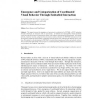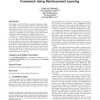1630 search results - page 7 / 326 » Coordinated Reinforcement Learning |
ATAL
2007
Springer
14 years 4 months ago
2007
Springer
This paper presents the dynamics of multiple reinforcement learning agents from an Evolutionary Game Theoretic (EGT) perspective. We provide a Replicator Dynamics model for tradit...
ICRA
2010
IEEE
13 years 8 months ago
2010
IEEE
Multi-robot systems researchers have been investigating adaptive coordination methods for improving spatial coordination in teams. Such methods adapt the coordination method to th...
AROBOTS
1998
13 years 9 months ago
1998
This paper discusses the emergence of sensorimotor coordination for ESCHeR, a 4DOF redundant foveated robot-head, by interaction with its environment. A feedback-error-learning(FEL...
ATAL
2007
Springer
14 years 4 months ago
2007
Springer
It is known that the complexity of the reinforcement learning algorithms, such as Q-learning, may be exponential in the number of environment’s states. It was shown, however, th...
HPDC
2009
IEEE
14 years 1 months ago
2009
IEEE
In this paper we describe Maestro, a dataflow computation framework for Ibis, our Java-based grid middleware. The novelty of Maestro is that it is a self-organizing peer-to-peer s...


